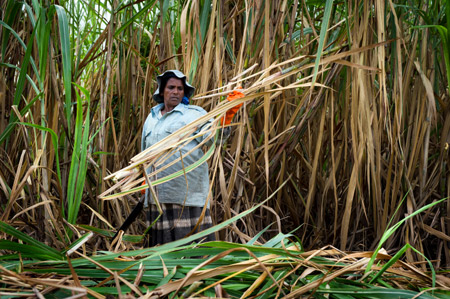Record Sugarcane Crop in Louisiana
Category: Sugar
(FarmProgress) – High tonnage and sugar content were hot topics of discussion at an LSU AgCenter meeting for Teche area sugarcane farmers on in Jeanerette, La.
Kenneth Gravois, AgCenter sugarcane specialist, summed up the 2017-18 cane crop: “A great crop, a great year.”
Gravois told attendees of the meeting in Jeanerette that sugar production in Louisiana set a record at 1.82 million tons, resulting from field yields averaging 8,853 pounds of sugar per acre.
Farmers and mills both had reasons to be pleased with this crop with high sugar recovery and high cane tonnage, Gravois said. Last year marked the state’s second-largest crop in terms of tonnage.
The 440,000 acres of cane harvested last year will probably increase by about 10,000 acres this year, he said.
February 2017 was the warmest on record, Gravois said, and it appears that February 2018 may set another record. The past year was the sixth consecutive year with above-averagerainfall, he said.
Snow in December seemed to protect sugarcane during freezes that slowed the harvest. It remains uncertain what effects the dry fall weather will have on plant cane.
“It will take time before we know the extent of damage in these late-planted fields,” Gravois said.
Prices steady
Kurt Guidry, LSU AgCenter economist, said the Florida sugarcane crop suffered from tropical weather, and that has kept prices steady.
He said Mexican sugar importation decreased last year but has increased slightly in recent months.
He said farmers should expect fuel and fertilizer prices to increase production costs this year by about $10 an acre, and land rent may be higher.
Farmers would be wise to take advantage of soybean futures above $10 a bushel, Guidry said.
“I would seriously look at trying to lock in some of those prices,” he said, adding that China is buying less soybeans, and a price of $8 to $9 a bushel is likely.
Al Orgeron, LSU AgCenter pest management specialist, covered different herbicide options. He said the product Armezon is showing good results for bermudagrass control if it is mixed with Trycera.
He said studies of cover crops on sugarcane land are ongoing. The practice has the potential to conserve soil and add nitrogen to the soil once the cover crops decompose.
Jeff Hoy, LSU AgCenter plant pathologist, said it is likely this winter’s cold temperatures has helped suppress brown rust and smut.
Brown stripe is more of a stress-related disease, and it’s uncertain if it has been affected by the cold weather, Hoy said.





